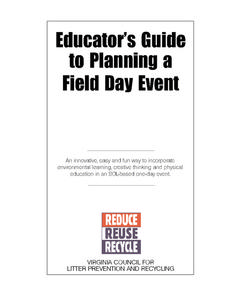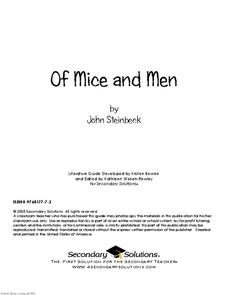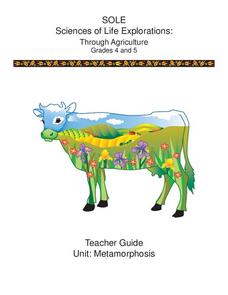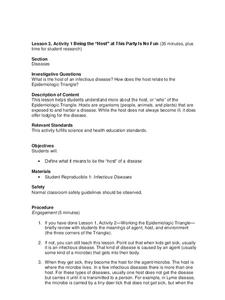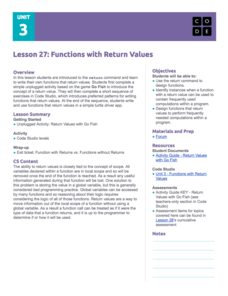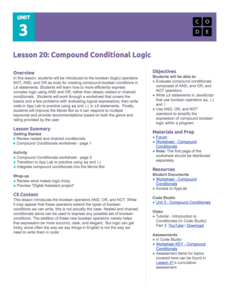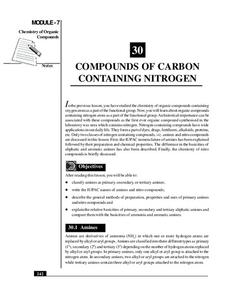Virginia Department of Education
Educator’s Guide to Planning a Field Day Event
Plan an environmentally friendly field day for your young conservationists with this collection of activities and resources. Whether it's bowling with plastic bags full of crumpled up newspaper and empty plastic bottles, or having relay...
King Country
Lesson 10: Communication - Day 3: Asking for What You Want
High schoolers practice appropriate verbal and non-verbal methods of asking for what they want in a lesson designed for the special education classroom.
King Country
Lesson 13: Communication - Day 6: Decision-Making
Decision making, including decisions that are made for us by others, decisions that are easy to make, and those that are not are the focus of a skill-building instructional activity that provides class members with a four-step...
Secondary Solutions
Of Mice and Men: A Literature Guide
Whether you are planning on using Of Mice and Men for whole-class reading or as a selection for literature circles; whether you are new to John Steinbeck's novel, or it has long been a part of your curriculum, you will find a wealth of...
Curated OER
Dilworth Elementary Character Education Respect (September)
R-e-s-p-e-c-t, find out what it means to your class! After a grand conversation about what is, and how one can show respect, scholars take part in a plethora of activity choices such as role playing, a game of Simon Says, wood working,...
Cornell University
Metamorphosis
Looking for an insect unit that addresses multiple skill strategies? Young entomologists explore multiple life cycles of insects that go through metamorphosis. The brainteasers and mobile activity spark learner interest before guiding...
University of Georgia
Stoichiometry of S'mores
How fun would it be to teach the concept of stoichiometry while allowing your chemistry class to assemble a classic campfire treat? This fun and engaging activity allows pupils to explore the principles of the chemical theory while...
Centers for Disease Control and Prevention
Understanding the Epidemiologic Triangle through Infectious Disease
Introduce infectious diseases and the epidemiologic triangle. A helpful resource describes the agent, host, and environment from the three vertices as well as the time factor, which is in the middle. Scholars complete a simple...
Centers for Disease Control and Prevention
Being the “Host” at This Party is No Fun
Discuss the symptoms and variations from infectious diseases from one person to the next. After a class discussion, small groups complete research on the topic.
Clarkson University
Forms, States, and Conversions
Searching for a way to integrate multiple concepts of energy conversion while captivating a middle school audience? This lesson presents topics related to potential and kinetic energy and offers the ability to allow pupil interaction.
Code.org
Functions with Return Values
Young computer scientists explore how to use the return command in computer programing by playing Go Fish. They learn about functions that return values and then write a turtle driver app using the return function.
Code.org
Event-Driven Programming and Debugging
Start programming in event-driven style. Scholars learn to place buttons on the user interface and use event handlers. They also learn to recognize errors in code and debug as necessary. This is the second lesson in the series of 21.
Code.org
Compound Conditional Logic
Scholars explore compound conditional logic and learn to use the Boolean operators AND, OR, and NOT within conditional statements by incorporating these operators to improve a previously created app.
Code.org
Digital Assistant Project
Scholars apply previously learned skills to create a functional computer program. They produce a digital assistant incorporating string commands and complex conditional logic.
Code.org
While Loops
Bring your pupils in the loop with while loops. Scholars learn how to modify conditional statements to produce while loops in the 14th lesson of the series. They use flowcharts to understand loops and then program some examples of loops.
University of Georgia
Heating and Cooling of Land Forms
Compare heating and cooling rates of different land forms. A lab activity has groups collect data on the rate of heating and cooling of soil, grass, saltwater, fresh water, and sand. An analysis of the rates shows how the different land...
University of Georgia
Splat!
What does viscosity have to do with splatter? An activity shows that the viscosity of a substance is inversely proportional to the distance of its splatter. Learners conduct the experiment by collecting data, graphing, and analyzing the...
National Institute of Open Schooling
Radioactive Pollution
Radioactive pollutants can enter the body through ingestion, inhalation, absorption, or injection. The last lesson in a series of 36 introduces pupils to radioactive pollution. They study its sources, both natural and man-made, its...
National Institute of Open Schooling
Compounds of Carbon Containing Nitrogen
Amines are vital to humans because they help form amino acids, the building blocks of proteins. The 30th lesson in a series of 36 specifically focuses on the organic compounds that contain nitrogen. Learners classify amines and nitro...
National Institute of Open Schooling
Hydrocarbons
The vast majority of hydrocarbons humans use help fuel cars, homes, and provide energy. A comprehensive lesson teaches pupils all about hydrocarbons. From alkanes, alkenes, and alkynes to benzene, classes study the preparation of these...
National Institute of Open Schooling
p-Block Elements and Their Compounds – II
Ozone, made of three bonded oxygen atoms, is found 15-30 km above Earth, has a strong smell, is blue, and blocks sunlight from hitting the surface of Earth. The 22nd lesson in a series of 36 specifically focuses on the important elements...
National Institute of Open Schooling
Chemical Equilibrium
Le Chatelier's interest in thermodynamics and building materials such as cement and plaster led to the Le Chatelier Principle in 1884. Activity 13 in a series of 36 extensively explores chemical equilibrium. Learners read about...
National Institute of Open Schooling
Ionic Equilibrium
Scientific studies show the older we get, the more acidic we become. The activity extensively teaches high schoolers about acids and bases. By the end of the 14th installment of 36, they can define and explain three concepts of...
National Institute of Open Schooling
Biomolecules
An informative lesson has learners read about, discuss, and study the classification, structure and importance of the following biomolecules: carbohydrates, proteins, lipids, nucleic acids, and enzymes.


